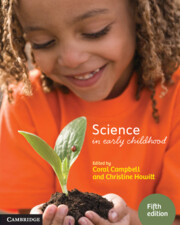Book contents
- Science in early childhood
- Acknowledgement of Country
- Science in early childhood
- Copyright page
- Foreword
- Contents
- Contributors
- Acknowledgements
- Introduction
- Part 1 What initial information should I know to teach science?
- Part 2 How can I enhance children’s learning of science?
- Part 3 How can I use the learning environment to enhance children’s science understandings?
- Part 4 How do I plan and assess in science?
- Chapter 14 Planning for teaching science in the early years
- Chapter 15 Intentional teaching of science
- Chapter 16 Observing, assessing and documenting science learning
- Chapter 17 Science education: professional learning through reflective practice
- Book part
- Index
- References
Chapter 16 - Observing, assessing and documenting science learning
from Part 4 - How do I plan and assess in science?
Published online by Cambridge University Press: 13 December 2023
- Science in early childhood
- Acknowledgement of Country
- Science in early childhood
- Copyright page
- Foreword
- Contents
- Contributors
- Acknowledgements
- Introduction
- Part 1 What initial information should I know to teach science?
- Part 2 How can I enhance children’s learning of science?
- Part 3 How can I use the learning environment to enhance children’s science understandings?
- Part 4 How do I plan and assess in science?
- Chapter 14 Planning for teaching science in the early years
- Chapter 15 Intentional teaching of science
- Chapter 16 Observing, assessing and documenting science learning
- Chapter 17 Science education: professional learning through reflective practice
- Book part
- Index
- References
Summary
Chapter 16 presents information on how EC professionals observe, assess and document science learning. EC professionals use evidence to determine what children know and understand, and base this on a process of observation (how children explore and interact within their environment), anecdotal note-taking, journal entries, checklists and folios of children’s work. The chapter describes strategies associated with the assessment of learning in science as outlined in the EYLF and the Australian Curriculum: Science. The information in this chapter is supported by case studies of EC professional practice.
Keywords
Information
- Type
- Chapter
- Information
- Science in Early Childhood , pp. 244 - 263Publisher: Cambridge University PressPrint publication year: 2024
